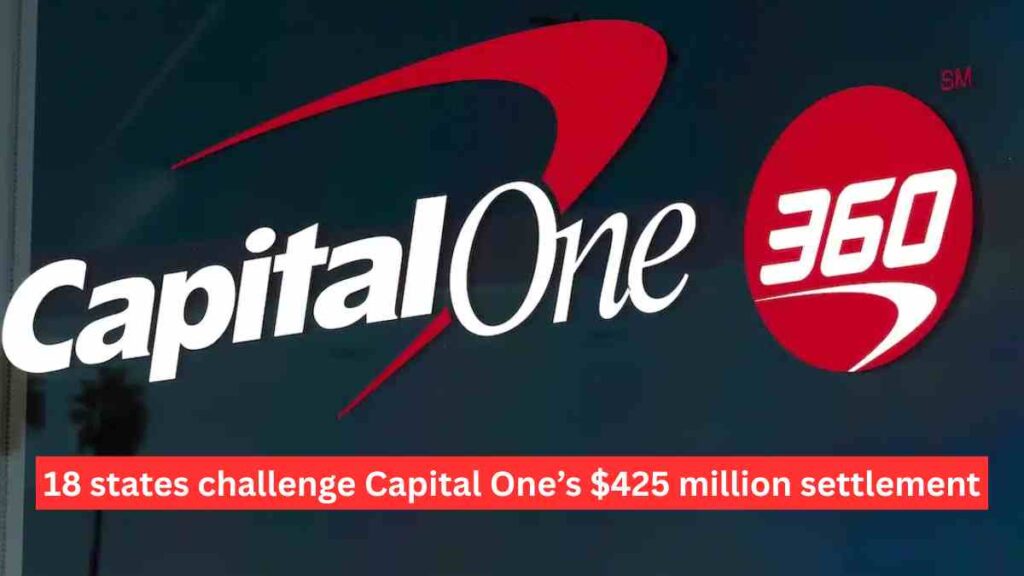
18 State Attorneys General Slam Capital One’s $425 Million Settlement — Here’s Why They Call It “Unfair and Inadequate”
WASHINGTON, D.C. — Attorneys general from 18 U.S. states have joined forces to oppose a proposed $425 million class action settlement with Capital One, arguing that the deal is “not fair, reasonable, or adequate.”
In an amicus brief filed in Virginia federal court, the state officials claim the proposed agreement fails to compensate customers fairly — and even worse, could allow the bank to continue its alleged deceptive practices.
The class action lawsuit accuses Capital One of misleading millions of customers by marketing its 360 Savings account as a “high-interest” option, when in reality it paid much lower interest rates than the bank’s 360 Performance Savings account.
According to the lawsuit, this practice cheated customers out of more than $2 billion in unpaid interest.
What the Settlement Would Offer
Under the proposed deal, Capital One would pay:
- $125 million in future “additional interest” payments to customers holding 360 Savings accounts
- $300 million in direct cash payments to affected class members
On paper, that might sound like a victory. But according to the attorneys general, the settlement doesn’t go far enough — and might actually reward Capital One for continuing its dual-account strategy.
Why States Say the Deal Isn’t Enough
The 18 AGs argue that the settlement “lacks fairness and real value.” Their main concern is that it allows Capital One to maintain what they call a “two-tier scheme,” where one group of customers earns less interest while the bank promotes another account with better returns.
They also point out that the so-called “additional interest” payments are illusory — meaning they give the appearance of compensation but still fall far below what customers would have earned from the higher-yield account.
In their filing, the AGs said:
“The proposed deal perpetuates Capital One’s deceptive structure and fails to provide adequate relief to consumers who have already been harmed.”
AGs Say Capital One Already Lost Key Motions
The attorneys general also noted that plaintiffs have largely prevailed on the motions decided by the court, strengthening their case and showing that the claims have real legal weight.
Given that progress, they argue that the current settlement amount doesn’t reflect the true strength of the case — or the scale of the alleged harm.
In simple terms, the states believe the deal lets Capital One walk away too easily, without being held fully accountable.
Push for Government Oversight and Enforcement
The coalition of AGs urged the court to reject the proposed settlement unless it’s rewritten to protect government enforcement rights.
Specifically, they want the agreement to include an express carveout, meaning the settlement should not stop state or federal agencies from investigating or pursuing Capital One in the future for related deceptive acts.
Their stance is clear:
“No settlement should preclude governmental entities from exercising their sovereign powers,” the filing states.
Who’s Eligible for Compensation (If the Deal Moves Forward)
As it currently stands, the proposed class action settlement would benefit anyone who held a Capital One 360 Savings account between September 18, 2019, and June 16, 2025.
If approved, those customers would receive automatic payments as part of the distribution process — though the final amount would depend on court approval and the number of eligible claimants.
The Bigger Picture: Banking Transparency and Trust
This case highlights a broader issue: trust in financial institutions. When banks market one product as “high-yield” while offering a better one under another name, it can mislead average customers who assume they’re getting the best deal.
Regulators say it’s time to close those loopholes — and to send a message that fine print shouldn’t come before fairness.
What Happens Next?
The Virginia federal court will review the objections from the 18 state attorneys general and decide whether to approve, modify, or reject the settlement.
For now, the pressure is mounting on Capital One to renegotiate a fairer deal that addresses the states’ concerns and ensures real compensation for customers.
Bottom Line:
The $425 million deal may sound big, but critics say it barely scratches the surface of the $2 billion in alleged losses — and could let Capital One off the hook.
The court’s decision could determine whether this becomes a win for consumers or another chapter in corporate leniency.

श्रवण कुमार ओड़ जालोर जिले के सक्रिय पत्रकार और सामाजिक विषयों पर लिखने वाले लेखक हैं। वे “जालोर न्यूज़” के माध्यम से जनहित, संस्कृति और स्थानीय मुद्दों को उजागर करते हैं। उनकी पत्रकारिता का उद्देश्य है—सच दिखाना और समाज की आवाज़ बनना।






